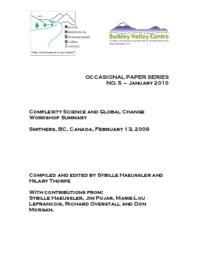Haeussler, Sybille
Person Preferred Name
Sybille Haeussler
Related Works
Content type
Digital Document
Description / Synopsis
It is prudent to understand how tree growth responds to climate variability to better project their growth in the current and future changes in climate in boreal forests. In this thesis, I studied how climate variables influence individual white spruce trees (Picea glauca (Moench) Voss) over short and intermediate periods in pure and mixedwood stands in northeastern British Columbia. In Chapter 2, I studied the importance and the influence of annual, seasonal, and monthly microclimate variables on the annual growth of white spruce trees in pure and mixedwood stands. In Chapter 3, I studied the importance and the influence of microclimate variables on sap flow of white spruce trees through different time scales in these two stand types. My key finding in these two chapters is that stand composition and structure are essential determinants of how spruce radial growth and sap flow respond to fluctuations in climate variables, and how they will respond to projected future climate scenarios. A combination of warmer temperatures and drought during summer will negatively affect white spruce trees growth in pure and mixedwood stands in the studied region. Spruce sap flow in both stand types is likely to increase as the climate warms, increasing the demand for soil water. As this resource becomes less available, white spruce in both stand types are likely to respond with processes that can compromise their physiological integrity. White spruce growing in mixedwood stands might be more sensitive to drought stress than in pure stands due to the higher competition for limiting resources (primarily water). This thesis provides information of expected changes in tree growth to climate variability and demonstrates the importance of appropriate site selection to plant spruce trees and management of pure and mixedwood stands.
Origin Information
Content type
Digital Document
Description / Synopsis
I studied how microclimate variables influence the growth of white spruce trees (Picea glauca (Moench) Voss) in pure and mixedwood stands in north-eastern British Columbia. My key finding is that stand composition and structure are essential determinants of how spruce radial growth and sap flow respond to fluctuations in climate variables. A combination of warmer temperatures and drought during summer will negatively affect white spruce trees growth in pure and mixedwood stands in the studied region. Spruce sap flow in both stand types is likely to increase as the climate warms, increasing the demand for soil water. White spruce growing in mixedwood stands might be more sensitive to drought stress than in pure stands due to the higher competition for limiting resources (primarily water). I provide information that will be useful in modeling and managing these stands across western Canada under current and future climate conditions.
Origin Information
Content type
Digital Document
Description / Synopsis
"The report and its supplementary databases were initially prepared for FFESC in March 2009 to (1) identify institutional arrangements for delivering climate change adaptation research and making the results available to stakeholders, (2) assess the status of research relevant to the FFESC mandate, and (3) recommend research and delivery needs that should be addressed by FFESC ...The report provides an overview of international-to regional-level agencies and institutional networks conducting and funding climate change research relevant to BC's forest and rangeland social-ecological systems."--Executive summary.
Origin Information
Content type
Digital Document
Description / Synopsis
"Complex systems science provides an inter-disciplinary framework for understanding and responding to global change phenomena. It seeks to understand the behaviour of whole systems and provides a common language and a suite of analytical tools that improve communication and integration across disciplines. Because it addresses whole-system behaviours that are beyond the scope of reductionist science, it can help to reconcile the culture clash between scientific and non-scientific approaches to understanding our world. In February 2009, the Bulkley Valley Centre for Natural Resources Research & Management (BV Research Centre) and the Natural Resources and Environmental Studies Institute (NRESI) of the University of Northern British Columbia co-hosted a half-day informal public workshop on Complexity Science and Global Change in Smithers, BC. The purpose of the workshop was to stimulate dialogue about complex systems science and how it can be applied to the challenges of maintaining sustainable ecosystems and communities in the face of global change. Presentations and lively discussion sessions focused on the relationships among complexity, diversity and resilience, genetic complexity in tree and salmon populations, restoring functional diversity in tropical forests, self-organisation in legal systems and managing natural resources under uncertainty. This document summarizes the presentations and discussions."
Origin Information




